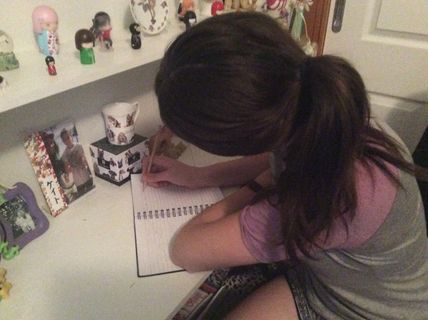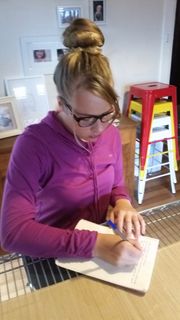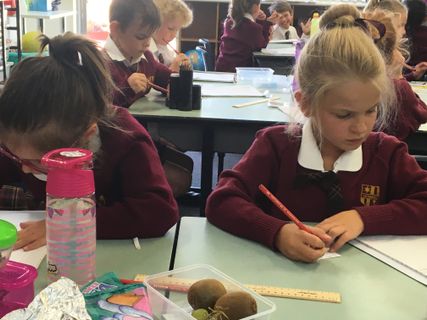Writing is more than putting words on paper
In the week before students returned,
staff were back at Dominic preparing
their classrooms, collaborating with
their colleagues and participating in
Professional Development.
Teachers on the K-10 Writing team were
fortunate to spend a whole day working
with Educational Consultant, Ivana Jones,
beginning the design of our K-10 Writing
Plan.
We know that writing is a vital skill
and having a strong foundation in
writing will allow our students to
confidently continue in all areas
of their education.
The Writing Team, made up
of Beth Gilligan, Selina Kinne,
Jane Doyle, Ganga Fraser,
Sue Cunningham, Janet Marcenko, Jessica Agius, Leesa
Maxwell, Therese McDevitt and Benjamin Fulton, began a
conversation with all teachers this week giving each person
the opportunity to contribute their vision of how writing
can be effectively implemented in subject areas from K – 10.
Why do we write?
When asked this
question Year 2
students thought of
many reasons including:
• So when we are
grown-ups we can
fill in forms and do
our signatures
• So we can share stories
• So we can tell people what we
know
• So we can celebrate things for
people and special events
• So we can invite people
• So we can ask questions
• So we can follow directions and
know what to do or how to get
somewhere
• When we can’t talk, we can
write
• So people who can’t see can use their braille writing so they
don’t miss out
How can parents help?
‘Writing is more than
just putting words on
paper. Writing is a
process of communication that plays an important role in your child’s
life—both in and out of the classroom.’ (A. Prince)
As a parent you can help your child develop
their writing skills by encouraging writing
activities that are simple and fun. Why not
give some of these a go?
- Leave notes on pillows,
desks, mirrors, wherever. Have your
child write you a note in return.
- A family
chalkboard or message board is a great
tool for encouraging your child to write
messages.
- Make letter writing a habit for
your child. Have your child write letters to family and friends.
Especially ‘thank you’ notes for gifts or whenever is appropriate.
- “Year in Review” Notebook - Keep an ongoing record of your
family’s life. Every family member can add to your family’s story.
Include important events that happen during the year. On New
Year’s Eve, sit down and read through your “Year in Review.”
- Give Writing as a Gift - For birthday presents or for other gifts,
have your child write a story
for the recipient.
- Journals – Give your child a
special journal. Encourage your
child to write in the journal as
often as possible.
“I really enjoy writing, and I have
a journal which I usually keep to
remind myself of upcoming events. However, I sometimes feel like
writing about certain memorable times in my life, so I can remember
them as well.” Kate Jones, Year 10 Academic Captain.
- Magnetic Scrabble – Put the letters on the fridge and create
messages for different family members.
- Play Word Games – Try Boggle, Scrabble or even Hang Man.
Ms Sue Cunningham
3-6 Coordinator of Teaching & Learning
 A Catholic School in the Salesian Tradition
A Catholic School in the Salesian Tradition



 Facebook
Facebook iOS App
iOS App Android App
Android App

